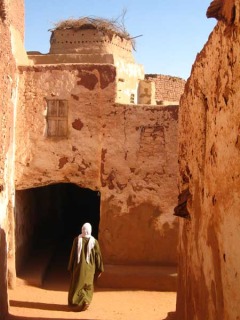Yahebah
From Mizahar Lore
| This article is about a location with its own forum to roleplay in. You can find it here. |
| Region | Eyktol | ||||
|---|---|---|---|---|---|
| Races |
| ||||
| Languages | Common, Shiber |
Contents |
The City
Weather
Yahebah has a more temperate temperature compared to the rest of the desert region due to its location near the southwestern coast.
Summer heat is extraordinarily high with more humidity than the rest of Eyktol, resulting in morning fog and occasional evening dew.
Late fall brings the seasonal winds from the coast, stirring sand one to six feet off the ground for as long as a month. Farmers tend towards an early fall harvest to avoid the winds roughly stripping the fruit from the vines and branches. Hika-Zulrav, the fiercer sandstorms, do not usually reach Yahebah from the interior of the region, but if they do, they arrive in fall.
Winter is surprisingly brisk. While snow is a rarity, ice and sleet are not unheard of. Scarce rains begin in late winter and may lead into spring.
With spring comes a brief brown haze of dust and sand over the usually clear skies. After this initial "fog", the season turns warm and bright. Spring is considered to host the nicest weather in the year.
History
Politics
Law
Economy
Industry
Culture
Architecture
Simple structures in Yahebah are constructed from bricks of mud mixed with straw while more complicated building are made of sand colored stone. Roofs tend to be flat or domed. Flat is preferred as Benshiras often eat or relax on the roof to enjoy the cool evening air or escape the heat of a cooking hearth.
The interior of structures is comprised largely of tile or stone to combat the desert's overwhelming heat. Furniture is scarce and low to the ground, as if the Benshiras have forgotten they do not dwell in tents anymore. A brazier commonly heats rooms in the evenings and homes are lit by hanging bronze lanterns.
More elaborate structures tend to have courtyards and outdoor halls behind protective walls. Windows are usually just openings high off the ground either shuttered or curtained
A third of the city is still in ruins, no more than heaps of stone and collapsed buildings. This destroyed area is contained to the southern portion of the city, but much of what still stands in the rest of Yahebah shows signs of past repair or damage.
Save where it has fallen in the south, a stone wall encircles the city. It is two chariots wide and hung with banners of white and scarlet. Yahalmen, the city guard, inhabit staggered rooms within it.
Cuisine
Yaheban cuisine is virtually Benshira's cuisine. Meat is not generally eaten by the common class save on special occasions. Meats include lamb, beef, wild fowl and dried fish and are served heavily seasoned and spiced. Wheat and barley come from Ahnatep to make various breads, often eaten with honey or olive oil. Olives are a staple of a Benshira's diet and make a common snack. Available fruits are pomegranate, grapes, figs and dates, anything else is a treat. Vegetables are found growing wild and include garlic and green onions. Milk and cheese comes from goats more frequently than cows.
Benshiras are better known for their spices than their staples. Teas and spice rubs are created with fastidious care and recipes are passed down from mother to daughter with the solemnness of ritual.
Three meals are taken in a day. The morning meal is very light consisting of tea, bread with honey and some form of fruit. The midday meal is a break in the working day and tends to be raw foods such as olives, figs, and cheeses, possibly paired with bread dipped in vinegar and olive oil. Watered down wine is the common drink. Evening meals are usually stews of lentils, beans and vegetables served in a communal bowl. Each diner will scoop out their portion with chunks of bread. If meat is available it will be served at this meal.
An invitation to take a meal with a Benshira is an important gesture, especially due to its communal nature. Eating a meal with a person means an acceptance and welcoming of that individual. Therefore, it is not uncommon that in public eating places Benshiras will not even sit near people of nefarious rank or race.
Holidays
Spring
Summer
Fall
Winter
Locations of interest
Listed below are some of Yahebah's important locations.


